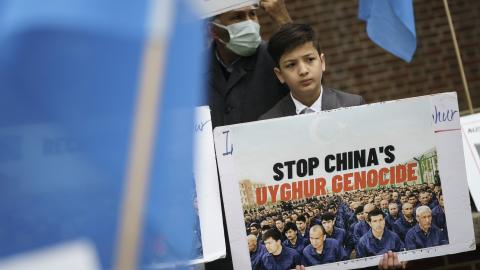When the Uyghur Forced Labor Prevention Act (UFLPA) was signed into law on Dec. 23, 2021, it promised to be groundbreaking in moving U.S. supply chains away from the People’s Republic of China. The legislation built upon existing U.S. law to strengthen import bans on products derived from forced labor and authorized the imposition of sanctions on entities involved in forced labor. Yet now, more than three years into its passage, the UFLPA is more a story of a missed opportunity.
It’s been known for decades that the Chinese government, the Chinese Communist Party (CCP), has rounded up as many as three million Uyghur people into industrial-scale concentration camps in China. This represents the largest incarceration of ethnoreligious groups since the Holocaust era. Those individuals – men, women, and children – are subject to systematic abuse, torture, malnutrition, and other inhumane conditions, including rape and constant political indoctrination. These abuses are well-documented through personal accounts, satellite images, and leaked Chinese documents.
This issue is personal to me. I, myself, was born in a similar internment camp, and it is a miracle that I survived after months of malnutrition and abuse that my mother and I endured. I was lucky enough to leave and restart my life in the United States nearly 29 years ago. But millions of others remain enslaved in the internment camps. This is why the passage of this landmark legislation, UFLPA, was so significant. It was a powerful way to educate America and the rest of the world about the genocide taking place in China, and the United States’ stance against it. Most Americans know nothing about the genocide in China, nor do they realize that the products they rely on every day – from clothing and food to mobile phones and batteries – are derived from the horrific conditions in those internment camps.
I had hoped that the U.S. government would leverage the UFLPA to shift American consumers away from slave labor. But that never happened. Our inaction to enforce UFLPA has emboldened the CCP to expand its genocide and forced labor practices within China and abroad.
A powerful example of how the CCP’s forced labor practices are penetrating the American market is the case of the Chinese company named The Fufeng Group Limited. Fufeng is a major producer and exporter of food additives, biochemical products, and starch-based products in China, and its food products have likely touched the dining table of every household and restaurant in America. Fufeng is controlled by the CCP, and it obtains slave labor from the Xinjiang Production and Construction Corps (XPCC), the Chinese paramilitary organization that organizes and controls the internment camps. Fufeng employs internment camps to produce millions of pounds of agricultural amino acids and xanthan gum for exports worldwide, including the United States. Yet despite the U.S. government sanctioning XPCC and two Chinese officials for human rights abuses against the Uyghur people in China, they are opening the door for Fufeng to find a physical presence in the U.S.
Wherever the plant is ultimately located, it will serve as a critical operating hub for the CCP and an outlet for forced labor in the United States. And until Fufeng settles on a U.S. location, it will continue to export products into the United States in violation of the UFLPA.
To be clear, the U.S. government is aware of Fufeng’s involvement in forced labor, its links with the CCP, its ties to the XPCC, and Fufeng’s circumvention of the UFLPA by transshipping products from third countries, including Canada, into the United States. Although the U.S. Customs and Border Protection has legal authority to detain Fufeng’s products, trace them to forced labor, and audit its records to map its circumvention activities, the agency has declined to take any such action. Furthermore, although the U.S. Department of Commerce has been investigating Fufeng in connection with Fufeng’s dumping of products into the United States and the resulting injury to American industries since 2012, the agency has, to date, refused to send its officials to audit Fufeng and document its forced labor practices. Even though Fufeng’s products obtain regular authorization from the U.S. Food and Drug Administration to sell products in the United States, none of the FDA’s food safety inspection audits have examined Fufeng’s forced labor practices in China.
In October 2023, Reps. Banks, Johnson, Moolenaar, and Finstad wrote to Secretary Blinken and Secretary Mayorkas regarding Fufeng’s links to the CCP, its involvement in forced labor, and the need for the U.S. government to act. It is now four months later, and there has been no appreciable improvement to the U.S. government’s enforcement of the UFLPA or any action concerning Fufeng.
The U.S. government’s repeated efforts to ignore Fufeng’s (and other Chinese companies’) forced labor practices perpetuate the forced labor atrocities across China. It is unacceptable – and merely the tip of the iceberg. Each month, millions of Chinese products enter U.S. ports, with the majority of them tainted by forced labor at some point within the supply chain. To date, however, the U.S. government has only denied entry to about 3,000 shipments for forced labor. And while there are tens of thousands of Chinese manufacturers complicit in forced labor abuses, only two dozen Chinese companies are designated to the U.S. government’s “blacklist,” the UFLPA Entity List.
America must do better. The U.S. needs to take a serious stance against forced labor and demonstrate that it will not aid, abet, or encourage the CCP’s forced labor by permitting transactions with the entities involved. Fully and adequately enforcing the UFLPA serves both the economic and strategic interests of the United States. It promotes fair competition, supply chain integrity, and investment opportunities while diversifying critical supply chains, strengthening geopolitical leverage, and ensuring long-term sustainability – all while divesting from horrible human rights abuses that have no place in our world.

















